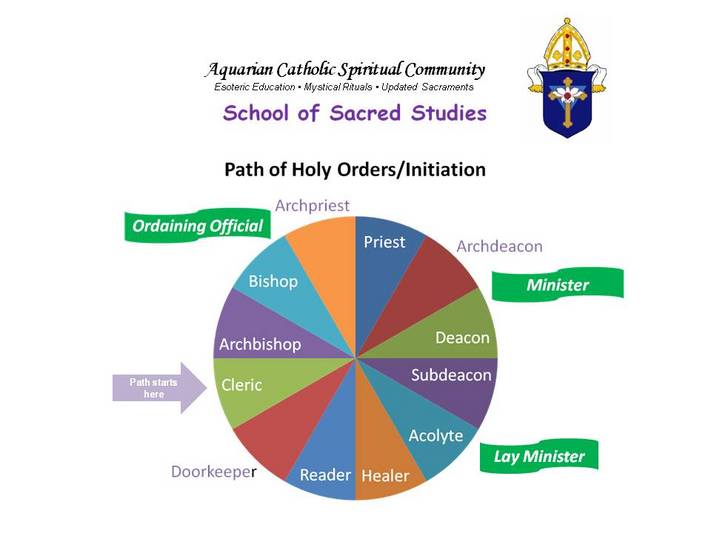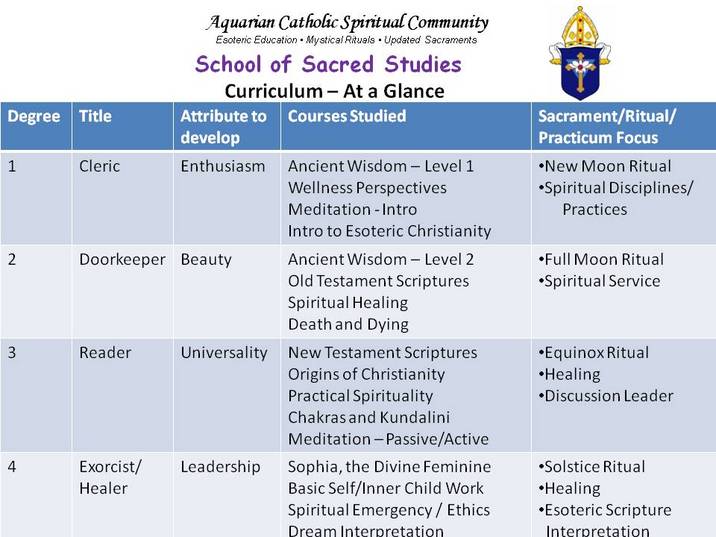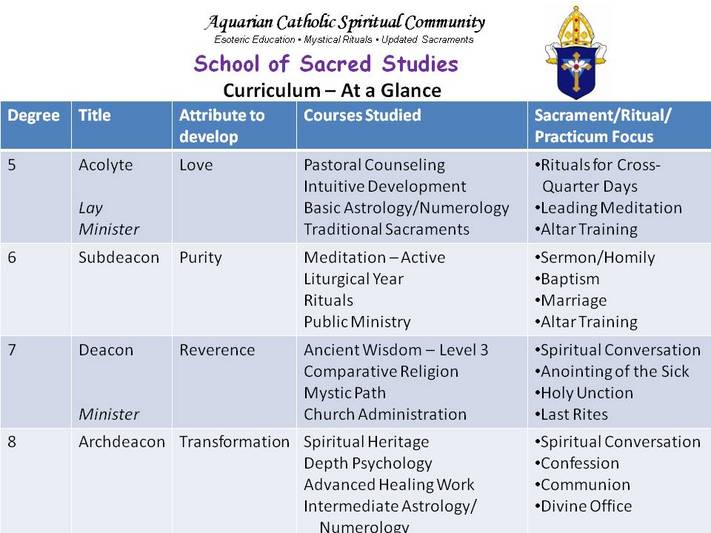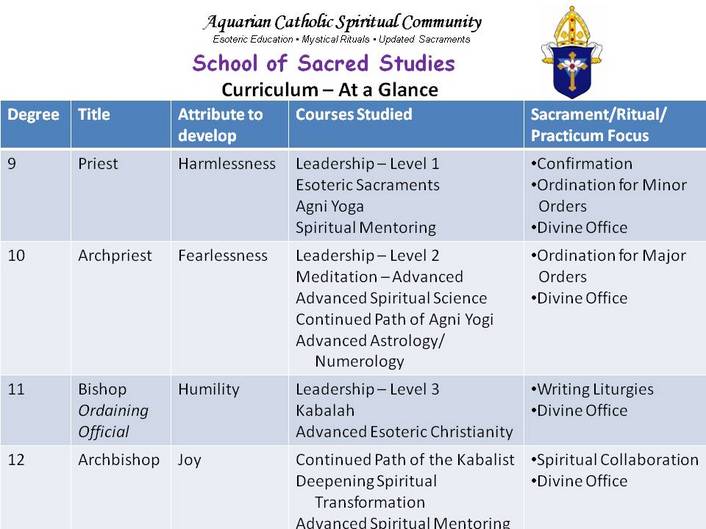Aquarian Catholic Spiritual Community
We Believe...
...that our program offers aspirants both traditional and esoteric focus to conduct public ministry. Initiative, self-discipline, personal transformation and the ability to be flexible are all good traits and useful skills for clerics. The heart of spiritual study relates to "Honoring Inner Divinity."
Overview
The Aquarian Catholic Community’s School of Sacred Studies was founded in 2010 in Arkansas. Esoteric Education, Mystical Rituals and Updated Sacraments are the foundations of the seminary curriculum and practicum. The School of Sacred Studies serves to educate clergy to perform sacramental public ministry. The Path of Holy Orders/Initiation is a structured approach for the mystical/esoteric development of the spiritual aspirant who desires to perform ministry in an Independent Catholic manner, along with those who desire ecumenical ministry.
We believe that all people already possess the attributes of priests, ministers, bishops, deacons and acolytes; our School of Sacred Studies serves to focus the spiritual striving for those on a dedicated Path of Holy Orders/Initiation. Ordination in the outer world of form may occur in 3 phases, 12 phases, or both combined. Programs are especially designed for each candidate, with the collaboration of a Program Facilitator and Bishop.
We believe that all people already possess the attributes of priests, ministers, bishops, deacons and acolytes; our School of Sacred Studies serves to focus the spiritual striving for those on a dedicated Path of Holy Orders/Initiation. Ordination in the outer world of form may occur in 3 phases, 12 phases, or both combined. Programs are especially designed for each candidate, with the collaboration of a Program Facilitator and Bishop.
A Program Facilitator...
is assigned to each spiritual aspirant on the Path of Holy Orders. The Facilitator co-works with the candidate to develop a program that is tailored to individual needs. Facilitators have at minimum been ordained a Deacon. Facilitators may only work with those through the degree beneath the one they themselves are currently pursuing. Facilitators and candidates meet monthly to maintain constant contact.
Financial Considerations...
follow the importance of an energy exchange. Candidates have options on how to realize abundance – they may make monthly love offerings of (suggested) $100 to the ACSC. Candidates may also choose to focus the energy exchange on Spiritual Service and donate a minimum of 10 hours per month in service-work. Students may also do a combination of the two…ie: 5 hours of service work per month with a $50 love offering to the ACSC. Work out financial considerations with the Program Facilitator and Bishop of the ACSC. Finances should not be a restriction to pursuing spiritual study. While we are always happy to receive financial contribution, we fully recognize the importance of energy exchange via service work.
Statement of Non-Discrimination
The Aquarian Catholic Spiritual Community, School of Sacred Studies, and Path of Holy Orders/Initiation, is open to all sincere aspirants. The ACSC believes that all humanity is becoming One family; we love all religions, traditions, nations, and races without discrimination of age, color, creed, gender, sexual orientation or status as a veteran.
Degrees...
are not offered by the ACSC School of Sacred Studies. Our focus is on inner transformation and preparing candidates for spiritual ministry.
Certificates...
are presented as each candidate is initiated in to the next degree. Certificates honor the work that each aspirant has completed and serve to remind us that we are all students on The Path.
Self-Paced...
is the focus – students complete course requirements and move through the program as quickly as they desire. There are no time limits.
Ordination...
rests in the collaborative decision of the candidate, Program Facilitator and Bishop. Students complete the necessary course of study and follow inner guidance as to when to seek Initiation to the next Order. Some people pursue the program for personal enrichment – others seek working towards a particular role. Move through Orders as you feel inwardly led to seek them.
Order of Maria Rosa Mystica...
membership is a personal choice. If you would like to learn more about the Order of Ave Maria, please contact +Tom for admission.
Prior Experience...
...is honored and recognized. Candidates with prior training or competence may apply for advanced standing with their Program Facilitator and Bishop. Applicants with prior academic theological studies will be asked to provide supporting documentation.
Distance Learning...
is a foundation of our program. Students gain experience in their own communities and complete courses through correspondence. As adult learners, each is responsible for their own learning.
Contact us
When you have read about what the ACSC School of Sacred Studies offers, please contact the school at: [email protected] or call +Tom’s cell phone at 479.295.116. We are here to help you along your path!




